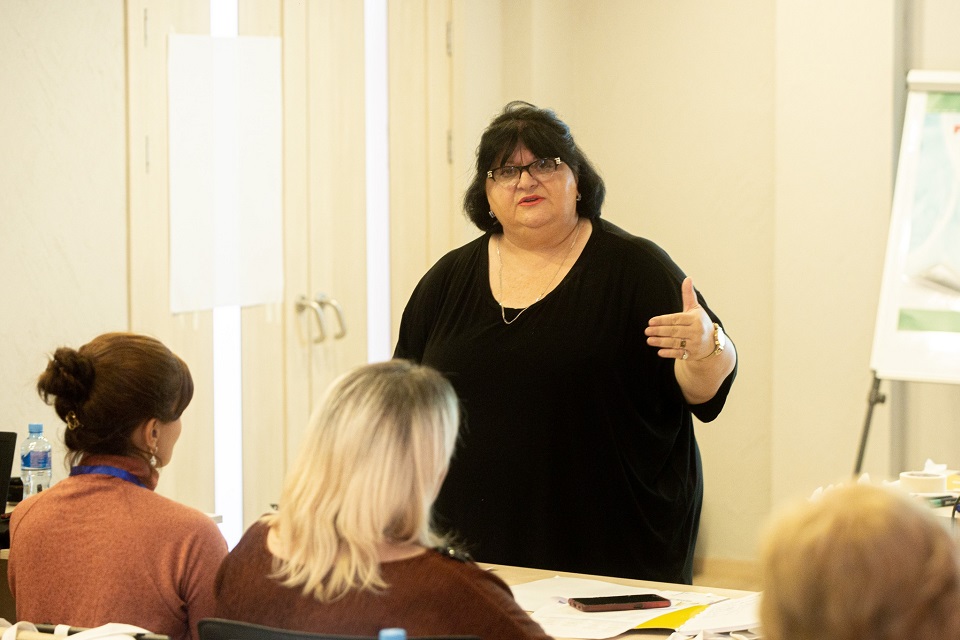In the words of Manana Jincharadze: “Teachers never fail to see when a child has been the victim of violence. That is why the steps taken by teachers are utterly vital.”
Date:

Manana Jincharadze, 59, is a consultant within a programme for school principals at the Teachers’ Professional Development Center of Georgia. She is a philologist by profession, and has long-standing experience working in the education system. Since the beginning of the 2000s, she has also been actively engaged promoting women’s rights in an attempt to make gender equality an essential value within Georgian schools’ day-to-day operations. Manana moreover instructs other trainers and co-authored a special module entitled “Gender Mainstreaming in Education: Gender-based Violence and Domestic Violence”. This particular component was created under a UN Women initiative, with the support of the European Union and the Teachers’ Professional Development Center, in collaboration with the Office of Resource Officers of Educational Institutions. Since its induction, training courses on domestic violence have been conducted in the scope of this module to prepare school principals, teachers and resource officers in Tbilisi, Kvemo Kartli and Guria.
![]()
At the beginning of the 2000s, when I first became passionate about and got myself involved in promoting women’s rights, there were only a few people in Georgia who were concerned with gender issues. I was a member of a women’s coalition that united a number of non-governmental organizations and worked towards gender equality issues. Concurrently, I worked at the No. 1 school in Chokhatauri, Guria—first as a teacher, then as the head of the educational unit and lastly as principal of the school. This [concern for gender equality] prompted increased criticism towards me. Many would denigrate me and say that I should promote our national traditions in school instead of gender equality. Some would even call me a destroyer of family values, but I would always use any leverage I had to reduce problems arising from the challenges we faced in regard to gender.
From the position of school principal, I was promoted to the head of a resource centre. Later on, I joined the Education Quality Development Center and finally proceeded to work for the Teachers’ Professional Development Center. Now, when I look back at the 2000s, I see how far we have come, but one thing is still unchanged: gender stereotypes continue to thrive in schools, and it is very difficult to turn a blind eye to this fact. It is in schools that the scope of inequality and violence are unveiled. It is the teacher whose role in this process is crucial. It is the teacher who can greatly impact students, even when they do not agree with their teachers.
In terms of violence, the most significant challenge the school system faces today is the deficit of civic awareness. It is this very deficit that drags us behind. Enforcement is also a challenge, as well as transforming knowledge into practice. Consequently, this special module incorporates a vast number of real-life examples; international conventions are being discussed from the perspective of a school’s day-to-day operations. The exercises are emotionally loaded, which also helps teachers to engage in the process more actively.
The training has shown us that, in contrast to previous years, teachers today have a deeper theoretical knowledge; they draw on examples from their own lives and personal experiences, and they check their attitudes and the style of their behaviour. Their interest towards topics is also rather remarkable: they want to have more information on how to report a case after violence is detected, how to apply the law, and what procedures there are for the use of electronic bracelets and protective and restrictive orders, as well as the definition of terms, all of which is a positive signal.
Teachers never fail to see when a child has been the victim of violence. That is why the steps taken by teachers are utterly vital. I believe that these training courses will bring numerous changes, and that is why I want to proceed with them and to encompass other issues too, such as gender sensitive environments, gender-sensitive budgeting and similar topics.”